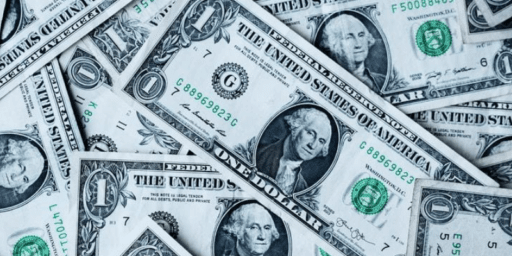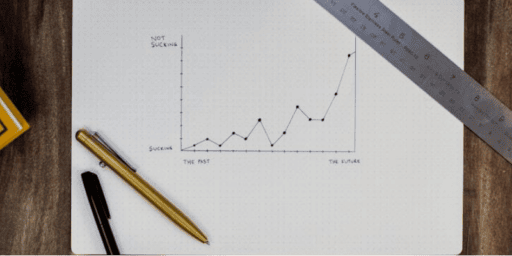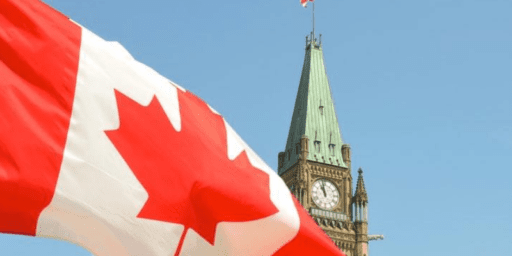Best Investments for a Canadian Recession
Over the last couple of weeks I’ve been getting a ton of emails and comments asking about the best stocks for a recession or how to prepare an investment portfolio for a recession.
The truth is that it’s a bit of a bad-news, good-news story.
The good news is that it’s probably not as bad as you think if you’re just reading news headlines. The other piece of good news is that you don’t have a lot of work ahead of you…
That’s because the bad news is there isn’t much you can do about the overall economy, and there is absolutely no way to know for sure where we are headed. I think a lot of experts have predicted at least 17 out of the last 5 Canadian recessions – so keep that track record in mind ;)
As I’ve been writing about over on Moneysense the last couple of years, even if the GDP numbers don’t scream “recession,” in regards to overall GDP going down, the economic reality for many Canadians sure feels like one.
But this should be the main takeaway: There’s really nothing you can do to stop a recession from happening. And even more importantly, the stock market and the economy are not the same thing. Just because the economy might be heading for a rough patch doesn’t automatically mean your investment portfolio is doomed.
In fact, one of the biggest mistakes Canadian investors make is letting economic fears dictate their investment decisions. It’s easy to get caught up in the doom-and-gloom headlines and think that you should sell everything and wait out the storm. But here’s the reality: Market timing is incredibly difficult, even for the pros. There’s a mountain of evidence showing that those who try to time the market typically end up worse off than those who stick to a long-term investment strategy.
I get it. No one likes to see red on their investment statements, and the thought of a recession can be nerve-wracking. But before you start panic-selling or hoarding cash under your mattress, it’s crucial to understand how recessions and stock markets actually work – and why they’re not as closely linked as most people think.
What’s a Recession Again?
In Canada (and most of the world), a recession is typically defined as two consecutive quarters of negative GDP growth. Gross Domestic Product (GDP) is a measure of all the goods and services produced within the country, and when that number shrinks for six months straight, you officially have a recession on your hands.
However, that’s just the textbook definition. In reality, recessions are a bit more nuanced. Economists look at a variety of indicators before labeling a downturn as a full-blown recession. These include:
Unemployment rates: If more people are out of work, less money gets spent in the economy, creating a negative cycle of reduced demand.
Consumer spending: When people tighten their belts, companies make less money, which can lead to layoffs and a slowing economy.
Business investment: When companies get nervous about the future, they cut back on spending and hiring, further slowing economic growth.
Housing market activity: In Canada, the housing market is a massive component of the economy. A slowdown in home sales and construction can be a key indicator of a recession.
I personally like to just keep the definition to the broadly defined two straight quarters of below-zero GDP growth.
Why Do Recessions Happen?
Recessions can be triggered by a variety of factors, but they usually boil down to one thing: a drop in demand.
When consumers and businesses cut back on spending, companies earn less, which leads to layoffs, which then leads to even less spending. It’s a vicious cycle.
Here are some reasons why recessions have happened in the past:
High interest rates: Central banks, like the Bank of Canada, raise interest rates to control inflation. But if rates go too high, they can stifle consumer spending and business investment, leading to a slowdown.
Financial crises: Think back to 2008. A collapse in the financial system can create a credit crunch, making it harder for consumers and businesses to borrow money.
External shocks: These include geopolitical events, natural disasters, or global pandemics (looking at you, COVID-19) that disrupt economic activity. Another example would be the oil price shocks of the 1970s.
Asset bubbles bursting: When speculative investments (like housing or crypto) become overvalued, a sudden drop can lead to a loss of wealth and confidence, triggering a recession.
The current talk of a Canadian recession is largely driven by high interest rates aimed at cooling down inflation.
The Bank of Canada raised rates rapidly from historic lows, making mortgages and consumer loans more expensive. That’s already led to a cooling housing market and reduced consumer spending – both of which are significant components of the Canadian economy. You combine that with all this tariff talk – and you may very well have the makings of a recession.
Is Canada Already in a Recession or Is There a Recession Coming?
That’s the million-dollar question. And the answer depends on who you ask. I recently wrote for MoneySense about the concept of a “per-capita recession” in Canada. This is where the economy is technically growing, but not fast enough to keep up with population growth. In other words, the economic pie is getting bigger, but each slice is getting smaller because there are more people sharing it. So, if you’re measuring GDP on a per-capita basis, Canada is already in a recession.
Notable Canadian economist Benjamin Tal has recently pointed out that a recession might be coming any day now. While Canada’s job market remains robust, high consumer debt levels and housing affordability issues could easily tip the scales. Add to that the impact of rising interest rates, which make mortgages and consumer loans more expensive, and you’ve got a recipe for that demand slowdown cycle that we illustrated above.
Of course, any good economist would hedge their bets and also say something along the lines of, “It could also be the case that the tariff issue gets resolved relatively quickly, US growth trickles down to Canada, a more business-friendly government gets elected, and Canada avoids a recession entirely.”
Are There Recession-Proof Stocks or Sectors?
FT wrote about recession-proof stocks in Canada (aka: “Defensive stocks”) a few months ago, and in my opinion not a lot has changed. I don’t know how much I buy into the idea of any single stock being recession proof, but in general, stocks with the following characteristics get hurt less in a recession “rush to the exits” than other stocks:
- A cash flow model that depends on necessity spending
- A long-term history of several decades without a dividend cut
- Earnings that don’t depend on market cycles
- Low volatility in the stock price
- Slow-but-steady growth rates.
Here’s a few sectors that most experts would say are reasonably safe in a recession (or at least as safe as equities can be).
Utilities: Utilities provide essential services such as electricity, gas, and water, which remain in demand irrespective of economic cycles. Companies like Fortis Inc. have showcased stability during past recessions, supported by regulated revenue streams.
Consumer Staples: This sector includes companies supplying essential products like food and household items. Retailers such as Loblaws have maintained steady performance during economic downturns, as consumers continue to purchase necessities.
Telecommunications: Telecom services are integral to daily life, encompassing phone and internet connectivity. Firms like Telus Corporation have demonstrated consistent demand, as communication services are essential for both personal and professional activities. This sector has been pretty beat up over the last 18 months, so there is an added layer of resilience there in terms of already-depressed consumer sentiment.
Waste Management: Waste collection and disposal are critical services that persist regardless of economic conditions. Companies such as Waste Connections benefit from the ongoing need for waste management services.
It’s also worth noting that certain types of healthcare stocks tend to do well in recessions – but we don’t really have a healthcare sector per se in our TSX.
How Long Do Recessions Last?
One of the most common fears during a recession is that it will last forever. But history tells us otherwise. Here’s a quick look at some past Canadian recessions and their durations:
- Early 1980s Recession: Lasted 18 months, triggered by high interest rates aimed at taming inflation.
- Early 1990s Recession: Lasted 15 months, driven by high interest rates and government spending cuts.
- 2008 Global Financial Crisis: Lasted 9 months in Canada, much shorter than in the U.S., largely because of Canada’s more conservative banking system. Caused by US mortgage crisis.
- COVID-19 Recession (2020): Lasted only 6 months, but was the fastest contraction in modern history.
The average duration of a recession in Canada is about 10-12 months. So while they can feel long and painful, they’re usually relatively short-lived compared to the expansions that come before and after them.
Investments During a Recession FAQ
Are We Ultimately Headed for a Recession and What Should You Do?
Here are some undeniable facts that should be the basis of your approach to investing during a recession.
1) No one can tell you for sure whether a recession is coming or not.
2) The economy is NOT the stock market.
3) Timing when to sell and when to buy stocks (aka: market timing) is notoriously difficult.
4) If you’re losing sleep over wondering if you have the right stocks for a recession, then you probably need to reevaluate your overall risk tolerance.
5) Canadian bonds, GICs, money market funds, and high interest savings accounts are pretty darn safe, even in a recession.
In my recent article on Trump tariffs and a trade war I went into pretty deep detail on why I wouldn’t panic.
Look, at the end of the day economists are famous for saying “On the one hand… and on the other hand.” That’s why President Truman is famous for saying, “Give me a one-handed economist!”
I could easily take Mr. Tal’s argument to and extreme conclusion and say something like, “The economic storm clouds are gathering. The housing bubble is about to burst given negative consumer sentiment, and we’re in for a lost decade there. While that might not sink our banks, it certainly is going to badly hurt profits. Trump tariffs are going to be a four-year problem that hollows out our manufacturing sector and kills our middle class. We’ve taken on too much debt, and that’s going to cripple the government’s ability to help everyone out when the storm hits. Oh – and don’t expect help from anywhere else in the world, as Europe and China are also struggling.”
Then I could do a one-man business news segment and argue with myself by saying, “Look, all of this bad news was priced into stocks a long time ago. When was the last time an expert said the Canadian economy was looking good? Yet the TSX has been on a great run! Sure there are some bad news headlines, but at the end of the day, Trump can’t afford to put tariffs on for very long. We’ll get a new trade agreement in place before the end of the year and business will continue as usual – except this time, maybe Canadians will support a reduction in provincial trade red tape too.
An undeniable truth at the moment is that the American economy is the growth engine of the world, and we happen to have the raw materials they want. When you consider our low dollar means our commodities are basically “on sale,” then it looks like a bright future ahead. Trump’s gone in a few years, Russia will probably go back to selling cheap oil to Europe, and we can all then focus on making money again. Remember, the stock market is NOT the economy. Big companies figure out ways to make money in all types of market conditions – it’s what they do!”
You have to be able to sleep at night. If you’re worried about recessions then this is probably a good time to revisit your overall risk profile and see if you have the right balance of long term investments and low risk investments. Certainly now would be a better time to look at that (after a couple years of excellent returns) than at the bottom of a recession.
If stable boring Canadian dividend stocks are still too volatile for your tastes, then I recommend checking out some of the fixed income choices on our Best Canadian ETFs list in order to balance things out.











Okay Señor Prévost, I will stay in my seat when the market gets turbulent (particularly for me;100% equity guy) just like the lessons in WFR. As always a valuable reminder. Thanks for the article.
Attaboy RC!